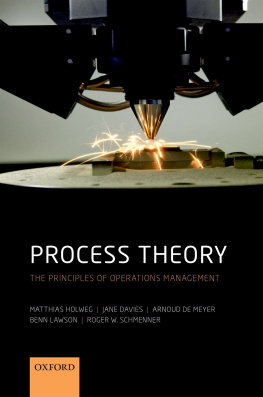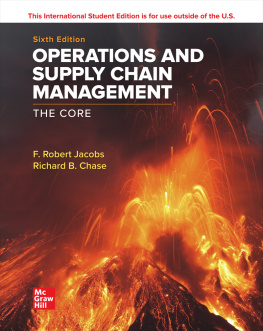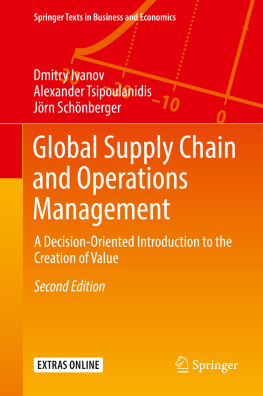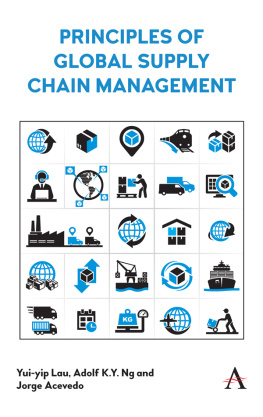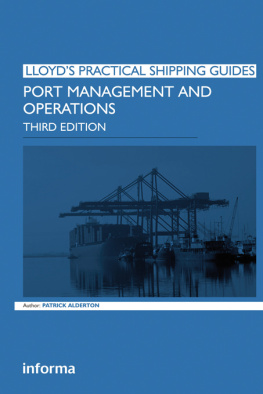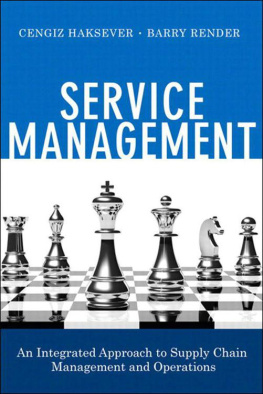Process Theory

Great Clarendon Street, Oxford, OX2 6DP, United Kingdom
Oxford University Press is a department of the University of Oxford. It furthers the Universitys objective of excellence in research, scholarship, and education by publishing worldwide. Oxford is a registered trade mark of Oxford University Press in the UK and in certain other countries
Matthias Holweg, Jane Davies, Arnoud De Meyer, Benn Lawson, and Roger W. Schmenner 2018
The moral rights of the authors have been asserted
First Edition published in 2018
Impression: 1
All rights reserved. No part of this publication may be reproduced, stored in a retrieval system, or transmitted, in any form or by any means, without the prior permission in writing of Oxford University Press, or as expressly permitted by law, by licence or under terms agreed with the appropriate reprographics rights organization. Enquiries concerning reproduction outside the scope of the above should be sent to the Rights Department, Oxford University Press, at the address above
You must not circulate this work in any other form and you must impose this same condition on any acquirer
Published in the United States of America by Oxford University Press 198 Madison Avenue, New York, NY 10016, United States of America
British Library Cataloguing in Publication Data
Data available
Library of Congress Control Number: 2017955389
ISBN 9780199641055 (hbk.)
9780199641062 (pbk.)
ebook ISBN 9780192548757
Printed and bound by CPI Group (UK) Ltd, Croydon, CR0 4YY
Links to third party websites are provided by Oxford in good faith and for information only. Oxford disclaims any responsibility for the materials contained in any third party website referenced in this work.
Preface
We started this book project when we were all based at Cambridge, sharing a common observation: what passed as theory in our field was all too often inadequate. In one respect, operations management scholars were bending over backwards to make theories from other fields fit our research problems. In another, questionable assumptions were being used to apply mathematics to operations management problems. Neither proved a good match with what we had observed in practice. Successful operations were managed by considerations that were far more straightforward than much of what was being published in our journals.
So we set out to codify these practical considerations into a set of principles that could be linked to key contributions that have been made to our field over the last century. Identifying principles was simple. Defining a parsimonious set of principles was far from it, however. Writing this book was not the swift, even flow ideal that we advocate for managers. We hence are immensely grateful for the patience and encouragement of our editorial team at Oxford University PressClare Kennedy, David Musson, and Adam Swallowwho stuck with us as the years went past.
As we complete this project, most of us have moved to pastures away from Cambridge. The team of authors now spans three continents. We have benefited, as always, from the numerous insights we have gleaned from operations of all types and from all over the world. All of these experiences have been important in grounding our work in reality. More than anything, these experiences have reaffirmed our original premise: at the heart of operations management stands a set of enduring principles, generic and time-tested.
Matthias Holweg
Jane Davies
Arnoud De Meyer
Benn Lawson
and Roger W. Schmenner
Contents
Matthias Holweg is Professor of Operations Management at Sad Business School, University of Oxford, where he also chairs the Technology and Operations Management group and Organization Studies department. His research focuses on the application and adaptation of process improvement methods across manufacturing, service, and office contexts. Prior to joining Oxford, he was on the faculty of the University of Cambridge, and a Sloan Industry Center Fellow at MITs Engineering Systems Division.
Jane Davies is Director of the Cambridge MBA and Senior Faculty in Management Practice at the Judge Business School at the University of Cambridge. Her research focuses on the role of operations management in creating organizational value and growth. Before her academic career, Jane spent ten years consulting to companies in the service and public sectors on process improvement initiatives and technology change projects.
Arnoud De Meyer

